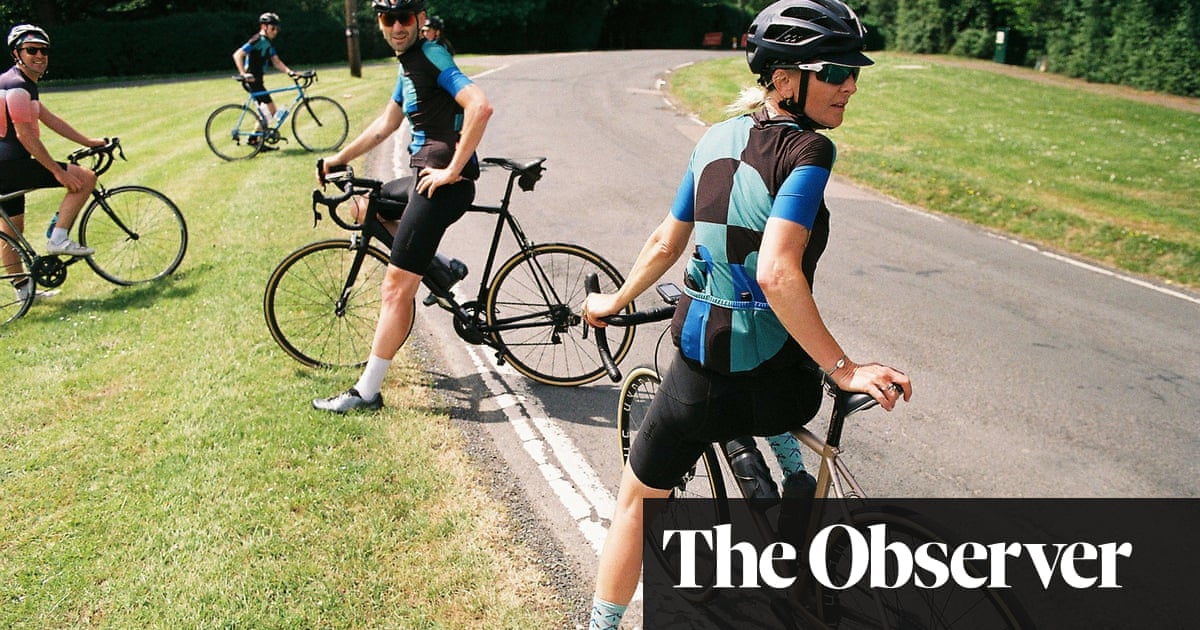
When Alice Clews-Smith and her partner, Kitty, moved to London, they didn’t see many options for pursuing their shared passion for cycling.
“I think it’s fair to say that the industry and the cycling scene were very male dominated,” she said. “There was a lack of space for women, trans-femme, non-binary people. We wanted a space where these people could feel welcomed and included. And because not everything is about going fast in Lycra.”
So was born the Steezy Collective, which brings together cyclists across the UK. Not that going fast is off the table. The collective noticed that there were no women in the Fastest Known Times list for the Lakeland 200 route – 200km of mountain bike trails through the Lake District – so they set about correcting that, and now the list includes nine women riders, with their efforts captured on film.
The existence of the Steezy Collective and others such as Sisters in the Wild, the Lakes Gravel Gang, the New Forest Off Road Club and 6am Cycling is part of a new wave of enthusiasts fuelled by the lockdown bicycle boom. Riders are now much more diverse than the cliched and not entirely accurate stereotype of middle-aged men in Lycra.
With miles of cycle paths opening up in cities across the UK, people reacted during the pandemic lockdowns by buying bikes in record numbers, with latecomers facing months-long waits. By March 2021, cycle traffic in England was 64% higher than in December 2013.
Now that has all changed. Last week, Wiggle Chain Reaction Cycles, one of the UK’s largest online cycle retailers, went into administration while Islabikes, which transformed the design of children’s bikes to make them lighter and easier to handle, said that it would stop manufacturing. The announcements came after three major UK distributors went bust, along with German company Signa Sports United, and the Italian firm Bianchi announced redundancies, Cycling Weekly reported.
So what went wrong?
“We could see it before anyone else,” said Martin Shepherd at Reynolds Technology in Birmingham, which for the past 125 years has made steel tubes used to create bicycle frames.
“During the pandemic, you couldn’t ship bikes fast enough,” he said. “Everybody’s lead time for orders [mostly to Taiwanese factories] started to go up nine months in advance, 12 months in advance.
“Now we’ve come out of the other side of it, there’s just vast amounts of inventory because all those people who were having to order 500 bikes 18 months in advance were suddenly swamped with stock.”
Customers, on the other hand, had been hit hard in their bank accounts. Sales have dipped, leaving companies with stock that’s proving hard to shift – something analyst Velco described as an economic “whiplash effect”, where small changes are magnified down the supply chain. Some bikes can now be bought at steep discounts since 2024 models will be arriving in a matter of weeks.
Shepherd said high interest rates, as well as post-Brexit trade barriers, were also playing their part. UK firms have specialised in mid- and high-end bikes, and sales to Europe had been substantial, but they have been hit by customs delays and extra charges. Now is an excellent time to buy a bike, but those bargains come with a price tag for the sector. If the market is flooded with more cheap stock, it could drive more firms out of business.
“In the long term, it could result in less choice for consumers because the more high street shops that shut, the less people there are to fix a bicycle or advise them,” said Jonathan Harrison, director of the Association of Cycle Traders, which represents retailers and repairers.
There have already been “quite a lot” of closures, he said, and there are now about 2,700 bike shops in the UK and another 1,100 workshops, hire centres and bike cafes.
“The likes of Wiggle closing will have impacts on other businesses, too, because a lot of distributors have been over-reliant on them as a sales channel,” Harrison said. “So we will see further repercussions happen, particularly in the supply chain. But I think the market will bounce back. We still think there is room for growth in the number of people cycling.”
There is another headwind for cyclists blowing from Westminster. Inspired by a narrow victory in the Uxbridge byelection in July, Rishi Sunak declared the end of an alleged “war on drivers”.
Whether that amounts, as some fear, to a declaration of a new war on pedestrians and cyclists remains to be seen – the prime minister’s plan for drivers includes a clampdown on 20mph speed limits, bus lanes and low-traffic neighbourhoods (LTNs), having slashed funds for cycle lanes and pavements in March.
Last Friday, the Commons’ public accounts committee said there had been “disappointingly slow” progress on increasing active travel. The Department for Transport has been ordered to conduct an LTN review and has canvassed views from local authorities, which campaigners say could lead to reopening rat runs closed years ago by tarmacking over cul-de-sacs and ripping out bollards and other so-called modal filters.
“During Covid we saw a massive increase in levels of cycling,” said Duncan Dollimore, head of campaigns at Cycling UK. “Since then, the numbers have dropped substantially and we’ve lost all the benefits. And part of the reason is government policy.
“There used to be a cross-party consensus on active travel, but there’s been a very substantial change in tone over the last 18 months. The whole narrative from the government has been very much against anything that’s perceived to be green, and it’s quite toxic.”
He said that a media campaign with “a certain degree of vilification of people cycling has an effect on people and then puts people off. The narrative against cycling isn’t helping these local industries.”
Phillip Darnton, the chair of the Bicycle Association, which represents larger manufacturers and retailers, said they have been trying to persuade ministers that the cycling industry presents an opportunity to boost economic growth.
“The whole industry is surprisingly valuable,” he said. “It’s probably generating about £7.5bn of added value to the UK economy and, if you include livelihoods, employs about 64,000 people.”
While it is often tempting to look enviously at the Netherlands and Denmark, which have been investing in cycling and cycle lanes since the 1973 oil crisis, Darnton pointed to Germany as inspiration. “In Germany last year they sold about 2.2m electric bikes and were disappointed they couldn’t satisfy the last 100,000 orders,” he said. “In the UK, we struggled to sell 150,000.”
France has had huge growth in ebike sales, he added, because the government had offered some modest subsidies. “The French say it’s not about how many euros or pounds but the very fact that the government says: ‘This is the strategy – we want to urge you not to use a car for short urban trips’ and makes it attractive for businesses to make deliveries in the last mile by cargo bike.”
Cargo bikes – larger, usually electric, bikes with a separate carrier – are one remaining bright spot, with people adopting them in growing numbers.
The trend is particularly noticeable in Cambridge, where it was instrumental in shielding Outspoken Cycles, which sells and services bikes in the city, from the worst of the lockdown effects, according to the shop’s general manager, Robert Hampton.
“We haven’t had the overstock issue for cargo bikes,” he said. “We’re now back to a lead time of about four weeks. It’s been steady growth: 20% more this year than last year, and 20% more last year than the year before. It’s much more of a steady increase of people looking more to move out of using a car for everyday journeys.”
Meanwhile, there are still plenty of riders who take the sport seriously, whether that’s taking one of the dozens of routes through the flat Cambridge Fens or the hills of the Yorkshire Dales. While appetites for a £300 commuter bike have waned, people who want to add another £10,000 bike to their collection are still doing so, according to Shepherd.
At 6am Cycling, there is room for both types of rider. The club was started by Tom Glendining and Lesley Sharpe in 2015 and really took off when they began their Fri-Day rides – a dawn trip through Epping Forest followed by a fry-up.
“It just started through a group of us going out really early on a Friday morning,” Glendining said. “And more people started joining.
“Everything’s shifted. Loads of girls getting into it now, which is fantastic. There’s Brothers on Bikes trying to get Muslim dudes out on bikes – they’ve started joining the fry-up rides as well. It’s not all about going fast – although we’ve got them too. There’s guys who ride with 6am who are incredibly strong riders and have done national time trials and all that. They’re all really lovely people. The main thing is you’ve got to be nice.”












